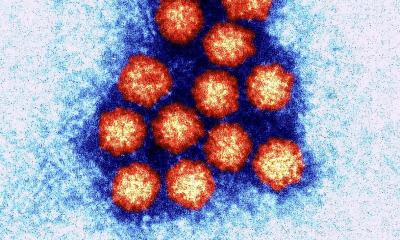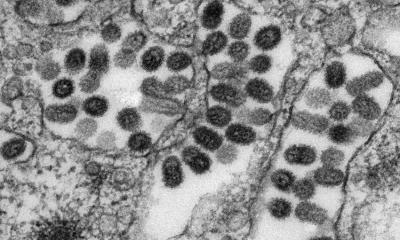News • Prenatal care
Fever itself in early pregnancy might cause birth defects
Researchers have known for decades that fevers in the first trimester of pregnancy increase risk for some heart defects and facial deformities such as cleft lip or palate. Exactly how this happens is unclear. Scientists have debated whether a virus or other infection source causes the defects, or if fever alone is the underlying problem.
Duke researchers now have evidence to suggest the fever itself, not its root source, could interfere with the development of the heart and jaw during the first three to eight weeks of pregnancy. Their findings, demonstrated in animal embryos, was published in the journal Science Signaling. The results provide new leads as scientists continue investigating heart defects, which affect 1 percent of live births in the U.S., and cleft lip or palate, affecting about 4,000 infants per year.

The animal models suggest a portion of congenital birth defects in humans might be prevented if fevers are treated through means including the judicious use of acetaminophen during the first trimester, said senior author Eric Benner, M.D., Ph.D., a neonatologist and assistant professor of pediatrics at Duke.
“My hope is that right now, as women are planning to become pregnant and their doctors advise them to start taking prenatal vitamins and folic acid, their doctor also informs them if they get a fever, they should not hesitate to call and consider taking a fever reducer, specifically acetaminophen (Tylenol), which has been studied extensively and determined to be safe during the first trimester,” Benner said. “While doctors advise most women to avoid any drug during pregnancy, there may be benefits to taking acetaminophen to reduce fever. Women should discuss all risks and benefits with their doctors.”
Benner cautions that nonsteroidal anti-inflammatory drugs (NSAIDs) such as ibuprofen and aspirin also reduce fevers, but one should not use aspirin, naproxen or ibuprofen during pregnancy. There is also ongoing debate over whether sustained use of acetaminophen is safe during pregnancy to manage ongoing conditions such as arthritis, Benner said. “However, its judicious use for an acute problem such as fever is considered safe. These findings suggest we can reduce the risk of birth defects that otherwise could lead to serious health complications requiring surgery,” he said.

To observe how fever impacts a developing fetus, the researchers studied zebrafish and chicken embryos. Among their discoveries, the scientists found that neural crest cells -- cells that are critical building blocks for the heart, face and jaw -- contain temperature-sensitive properties. “We found that these neural crest cells contain temperature-sensitive ion channels that typically are found in your sensory neurons,” Benner said.
The Duke researchers engineered a noninvasive magnet-based technology to create fever-like conditions in two specific temperature-sensitive ion channels called TRPV1 and TRPV4 in the neural crest cells involved in developing the heart and face. When those neural crest cells were subjected to conditions mimicking a transient fever, the embryos developed craniofacial irregularities and heart defects, including double outlet right ventricle, Tetralogy of Fallot and other outflow obstructions.
The type of defect depends on whether the fever occurs during heart development or head and face development in the embryo. What researchers still do not know is whether or how the severity or duration of a fever impacts development, Benner said.
In addition to Benner, study authors include Mary R. Hutson, Anna L. Keyte, Eric Gibbs, Zachary A. Kupchinsky, Ioannis Argyridis, Kyle N. Erwin, Kelly Pegram, Margaret Kneifel, Paul B. Rosenberg, Pavle Matak, Luke Xie, Jörg Grandl, Erica E. Davis, Nicholas Katsanis of Duke, and Miriam Hernández-Morales and Chunlei Liu of the University of California, Berkeley.
Disclosures: Co-senior authors Benner and Liu have filed a patent application relating to the use of FeRIC technology for cell modulation and treatments.
Source: Duke University Health System
16.10.2017





